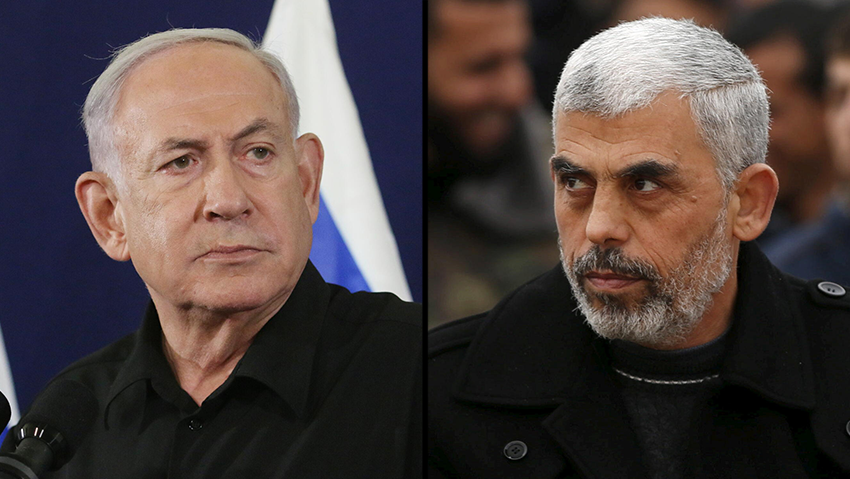Getting your Trinity Audio player ready...
Few issues evoke as much pain and anguish as the matter of the hostages. There's no need to agree with every word uttered by the relatives of the hostages to understand the immense and dreadful pain they endure. Their suffering is twofold: both that of the hostages abandoned due to the historic failure of the state and their own. And nothing compares to the joy of liberation, following an incredible operation, like that of Fernando Simon Marman and Louis Har.
Read more:
However, this joy is tinged with sorrow for two Golani fighters, Adi Eldor and Alon Kleinman, who were killed earlier in the operation, reminding us of the endless price of the never-ending war. Yet, there's still concern that we're on the wrong path. Because what starts as a crucial national struggle to free captives morphs into a political and party struggle.
The blame rests squarely on Benjamin Netanyahu. It's all about him, him and him. And there's no denying that. There are a thousand and one valid criticisms regarding his handling of the situation, both before October 7 and in the aftermath of the blow Israel suffered due to that failure. But criticism shouldn't dictate our opinions.
Is he the one obstructing the captives' deal? Does he not want them to be released? It's not just a matter of supreme national interest; it's also his political interest. After all, Israel said yes to the Paris Accord. Yahya Sinwar refused. There isn't a single political leader, from Yair Lapid and Naftali Bennett to Benny Gantz and Gadi Eisenkot, who's willing to negotiate - in other words, capitulate - based on Hamas' demands. Except Netanyahu.
We know that not only are all Arab media outlets closely monitoring the struggle for their release, but Hamas is also paying close attention. Now, we should ask ourselves the tough question: When Yahya Sinwar says "no" after Netanyahu says "yes" – and the protests are against Netanyahu – will this prompt Sinwar to relent, or does he think to himself, "I just need to hold out a bit longer"? The answer is known. So why do we do this to ourselves?
There are valid criticisms of the horn-blowing team leading the fight against the hostages' families. But this team doesn't act alone. The campaign to return the hostages is becoming increasingly political. The more it focuses on Netanyahu, and as the struggle for the hostages intertwines with the old protest to topple the government, it becomes both less effective and more partisan. Netanyahu needs to go. There are countless reasons. However, within the current hysteria, the hostage issue also creates political controversy. Instead of emphasizing the fact that all leading politicians in Israel oppose capitulation to Hamas, we are in a campaign that blames Netanyahu.
 Ben Dror-YeminiPhoto: Avigail Uzi
Ben Dror-YeminiPhoto: Avigail UziSinwar wants Israel's surrender. The captives are his bargaining chip. The prevalent approach is "a few more concessions" and there will be a deal. This is probably another illusion, reminiscent of international and Israeli peace initiatives. Want a state? Take a state. Want '67 borders? Take '67 borders. But no. Once upon a time, it seemed there were proposals the Palestinians couldn't refuse. So we made a few more concessions. And a few more. But they refused. They didn't miss an opportunity to miss an opportunity. They acted against their interests. After all, they wanted a state, or so we believed. Time and again, it becomes clear we were wrong. They didn't want a state. They wanted surrender. They called it "the right of return."
Now it's Sinwar. He doesn't want a deal. He wants surrender. But once again, we're in the trap of misconception. Sinwar knows that American pressure persists. He knows that, even if Israel needs to conquer Rafah, it will be a strategic quagmire due to the unavoidable humanitarian crisis. And he wants us to fall into that trap. True, military pressure hurts Hamas and depletes more and more of its military capabilities. But from Sinwar's perspective, and logically speaking, the more Palestinian casualties there are, and the more images of destruction are broadcast worldwide, the better his situation becomes.
He thinks strategically. He knows he's harming Israel's standing in the world. He knows he's fueling antisemitism. He hopes to undermine the Abraham Accords. He wants to portray Israel as South Africa. He doesn't mind losing battle after battle because, in his eyes, or at least that's how it seems to him, he's winning the war. Even in the operation to release the two hostages, the headlines around the world don't just focus on Israel's success but also, and sometimes more so, on the Palestinian claims of 60 casualties.
Israel could and should have declared more and more cease-fires and left the stubbornness to Sinwar. But Israel, and it's not just Netanyahu but the foolish consensus, chose a more offensive strategy, which may be effective militarily but damages Israel internationally.
The Hostages and Missing Persons Families Forum falls into the same trap. In the first weeks, the hostages' families exerted pressure through the international community. That was the right direction. It led to results. But the direction has changed. The narrative is shifting. Instead of blaming Sinwar, we blame Netanyahu. In other words, ourselves. Such a struggle only strengthens Sinwar and makes his heart harder. This is not the way. This is not how you bring hostage deals closer. This is how you push them away.



